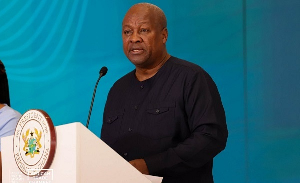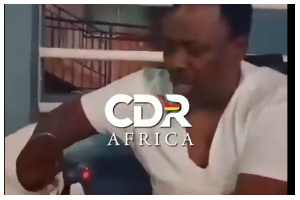Business News of Saturday, 23 October 2004
Source: Standard and Poors
B+ & B Ratings Affirmed - Outlook Stable
LONDON (Standard & Poor's) Oct. 22, 2004--Standard & Poor's Ratings Services said today it affirmed its 'B+' long-term and 'B' short-term foreign and local currency sovereign ratings on the Republic of Ghana. The outlook is stable.
"The ratings on Ghana balance weak general government finances and a low level of economic development with a relatively stable political environment, improving external liquidity, and manageable levels of net public external debt and debt service payments," said Standard & Poor's credit analyst David Cooling.
Despite Ghana's short history of democracy, the political environment is increasingly stable. A process of democratization, which culminated in the election of President John Agyekum Kufuor in December 2000, is expected to result in similarly orderly elections later this year.
Following debt relief under the Heavily Indebted Poor Countries (HIPC) initiative, Ghana's general government debt-to-GDP ratio is forecast to fall to about 90% in 2004. At the same time, gross public sector external debt is forecast to fall to 147% of current account receipts (CARs). At an estimated 16% of GDP, the domestic debt burden remains significant in 2004. In addition, domestic debt is mostly short-term and carries high rates of interest. Reducing domestic debt to about 10% of GDP, however, remains a central goal of fiscal policy.
Declining current account deficits and robust capital inflows have improved external liquidity. The current account is forecast to be broadly balanced in 2004. Ghana's gross external financing requirement should fall to about 46% of reserves in 2004, from close to 385% in 2000. Furthermore, external debt service including short-term debt is modest, at 12% of CARs.
The stable outlook on Ghana balances prospects for a continuation of fiscal restraint against the risk of further slippage in the government's reform agenda, continued dependence on foreign grants, and vulnerability to international commodity prices.
"In the post-election period, an acceleration of structural reforms beyond current expectations would strengthen the resilience of the economy and the government's financial position and credit standing in the medium term," said Mr. Cooling. "Conversely, weaker fiscal discipline or renewed slippage in the implementation of crucial reforms, which would also undermine donor support, could place the ratings under downward pressure."
Ratings information is available to subscribers of RatingsDirect, Standard & Poor's Web-based credit analysis system, at www.ratingsdirect.com. It can also be found on Standard & Poor's public Web site at www.standardandpoors.com; under Credit Ratings in the left navigation bar, select Find a Rating, then Credit Ratings Search.












